Jinn and Adam's Rib
By: Mike Spencer Bown
Illustrations:
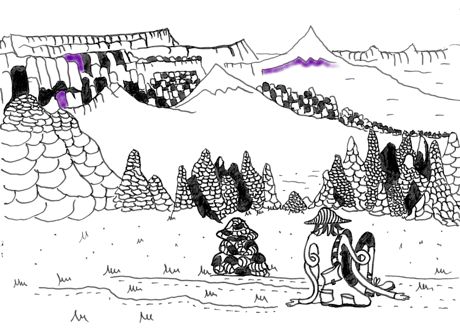
Most afternoons, I'd trek off into the Jordanian hills along winding trails scratched by hooves in the gravel, and crouch in the shadows of pale cliffs, or eroded pinnacles and caverns striped with layers of purplish stone. The landscape was ancient, silent save for the occasional 'salaam'-ing of passing shepherd boys bounding after jingle-belled flocks. There was much time to sit, to sit and to think, and I revelled in it. At first I puzzled over an emotion lately conspicuous by its absence. When I'd started as a young backpacker, with mindsets schooled into me, I used to get caught in moods of cognitive dissonance. Travel does that, and then makes you adapt to be suppler in thought. For me the first adjustment had been to re-consider an assumption rising from formal education itself: that there was no harm in appearing aware. Unwise, so it turns out; I learned the importance of not being earnest, the hard way. Not everyone has your best interests to heart, and if you know what's going on, often the best strategy is never to let on. Draw out any machinations to observe and counter them, and so dodge traps and cons as if by dumb luck. This is a habit foundational to street smarts, that so frustrates teachers with a class from the 'hood.
The ultimate cognitive dissonance to trouble me concerned religion: I'd never understood what people got out of it; superstitions and ceremony, anniversaries like holidays and even birthdays, were important for others, not me. Now, just these last few years, I'd found myself fully as comfortable saying an Islamic prayer before slitting an animal's throat as I was perched on a mountainside reflecting on Zen koans. A formerly alcoholic Christian could babble about being born again, without me tempted to draw his attention to glaring inconsistencies of doctrine, rather, I'd appreciate his unspoken hope that his religious habit would save him from his drinking; likewise, if a tribesman wanted me to assist in a magic ceremony, involving mud and leaves and some creature's tongue, I'd stand with him, my toes in the dust. None of these felt foreign to me, at last, no cognitive dissonance between touching life-ways shaped before western science all the while dwelling comfortably in my own excessive worldliness.

When going a-hunting for spiritual sustenance, one can't help but notice that since the last ice-age there have been some conceptual additions to the dreamscape. Amid the spiritually intuitive wilderness, civilization has cleared some space for settlement: a towering jumble of religious concepts promising more humane and palatable provisions, like some sprawling food court. Nowadays, most of us perhaps take some note of other strange fast food franchises that our family never went to, but likely do not notice the wilderness except as a place to be shunned.

These religions offer diverse spiritually nutritious ceremonies and dogmas, but I also saw many metaphorically obese or anemic worshippers emerging from those doors, so I always suspected some people of filling up on the spiritual equivalent of empty calories and junk food. So what will it be? Often your parents decide for you. Muhammad's shawarma shop?; Buddha's antipsychotic nutri-ceudicals and whole foods emporium?; Paul's restaurant?: if Christ was its Macdonald, Paul was its Ray Kroc, who franchised this hyper-successful formula for Jewish, Greek, Persian fusion spiritual cuisine served in a tasteful family friendly location, billions served. Some of my friends savor Paul's most popular dish: All is well, all is well, and all manner of things will be well.
Backing away from this thriving glitzy enterprise, you might see there used to be a path, behind the smallest most rudimentary eatery, Zen's self-serve koan-salad bar, which is nothing more than a hut built more than half way into the forest. A careful snooping around, and you can still make out the signs, there, and ... there.. and deeper, there, like a subtle trace of the passage of a person or persons, and if you follow, you don't find any stuffed crust pizzas, but you'll find a different kind of spiritual sustenance, the equivalent of a stand of hazelnuts, a stream of salmon, a hillside of Saskatoon berries. Thereafter, you see many amazing rushing rivers and meadows and lakes of exquisite beauty. It is a hard, lean way, ascetic rather than luxurious - the spiritual sustenance equivalent of going walkabout and living on bush tucker - it's not a social place, and there are no gleaming ivory towers built of concepts stacked as brick or beams. And so there is no gilded dome of promised afterlife overhead to save you from the elements, only the star-sprinkled night.
If you frequent this trail you'll be able move swiftly and surely, and you'll find that it is not simply the path of mankind you follow, but that of life itself. Like the mysterious detour of monarch butterflies on their epic journey of migration: when flapping over Lake Superior they go out of their way to skirt a place where eons past stood one of North America's most formidable mountains, long since crumbled to dust. Butterflies remember a mountain † that hasn't existed for millennia. Like race-memories, these are the paths of lives lived, and the subtle signs you notice are the intuitions worn into the contours of the human mind by our ancestor's walking, brachiating, jumping, skittering, swarming, burrowing, swimming wiggling, over hundreds of millions of years of metamorphosis through design space, down all the layered ages of Earth.

As a young man I wondered, does anyone else notice or follow this path? And I came to suspect yes, because when I tarried back amongst the edifices of religious concepts that serve the masses, I saw that while these concepts can't match the native intuitions - since no mere words can do them justice - the artifice was admirable, particularly to those with a taste for the baroque. And where I saw beauty in it I recognized the motifs as having been inspired by experiences endemic to the spiritual wilderness. At least some of religion's prophets and saints must have trod these innate paths, and brought back inspiration and insight turned to decorating and advertising, especially to paint and spangle the ceilings of domes promising afterlife. To each his own; I don't begrudge a fundamentalist Christian his afterlife; after all, we are both of us looking skyward.

Devout people sometimes ask me if I want eternal life in heaven surrounded by friends and family: a paradise free from want, with rivers of milk and honey, and no servings of angst or hardship. Sure, the appeal of 'Big Rock Candy Mountain' is understandable, where there are lemonade springs and cigarette trees, hens lay soft-boiled eggs, and all the cops have wooden legs. But I want something other than that, from fear of awesome boredom. Typically my reply is to ask them if instead of 'this' me going on forever, can I be gifted a 'refreshed' me, setting out on a new life with fresh memories being laid down so the experiences are for the first time, another first taste of ice-cream, another first kiss? - Rather than undying persistence as some jaded simulacrum, who has been there and done that. Wouldn't that be great? And why stop there, how about the new me having a new and different body and different circumstances to learn from? Would it seem greedy to request that this resurrected or reincarnated self might live not in heaven with no frets or dreams - but on the adventurous side of the pearly gates, in interesting times, with new challenges? And even better, how about a clean break from my possessive ghost, and imbue this foundling babe with a different personality and so thus be not me, but someone else, in fact, themselves? After all, experience has taught me there is nothing so special about me beyond my being lucky enough to have lived this life. My heaven is that someone new gets a chance to be born and have their turn. And the most marvelous thing about the planet, and being alive as a human on it, is that this, my version of paradise is not only dreamt-of, but continuously granted, an embarrassment of riches.
I'm not proselytizing, rather the opposite, if only there were a word for it in any language. When pressed by religious people as to what I think about the afterlife, I tell them that whatsoever is after my life is my precious afterlife, and it better not include me, thank goodness. If Paul's Restaurant has a marvelous dome decorating the dining room, the neon signs strike you as clever and amusing, and the spiritual food fills our belly and satisfies, then good. Why venture, then, into the austere wilderness looking for spiritual sustenance of an unadulterated wild sort? The original Buddhist teaching of reincarnation is to know these two facts, and hold them in your mind undiminished and at once: when you die, you are reincarnated, and, there is no you. When dogmatic and unsmiling devotees hear this they are confused or appalled. It means nothing to them; it does not help them, only sowing confusion. So that is why I am anti-proselytizing, telling them to keep their faith. I've found kindred spirits enough, especially among fellow travellers, and ironically, among people most deeply invested in religion.

The fast food franchises make use of the talents of chef de cuisine, their best and brightest... who think and speak differently in private than they do to the masses. I note this especially because it's an observation at odds with the current hard-line religious versus anti-religious division in modern intellectual discourse. But I find I get along fine with intelligent priests, imams, shamans and rabbis. I've taken the time to talk to spiritual leaders of some of the more respected franchises, and partisans may be shocked to learn that these worthies are not taking advantage of the employee discount to eat out of the same spiritual fast food as the bulk of the customers.... they are definitely not drinking the Kool-Aid, nor even choosing from the menu or not often with much relish. When we sit down for an honest talk we find that we are both apt to explore the same paths in the spiritual wilderness, the source, and this is really where we all go for spiritual health. Most times they have a sense of humor, too.
Anyway, there's nothing amiss with a la carte helpings of religion; it's pleasant, sensible, kind, and human, with a nice blend of newfangled and pagan traditions. Provided no-one becomes a glutton for the stuff. Previously people didn't necessarily take religion over seriously: witness Chaucer's tales, for Pete's sake. Why should purists and extremists get to claim to represent religion, while moderates and sensible people have to be ashamed of a history of gently favoring human good, for as long as religions have been around? Their taxes and labour also built those cathedrals, mosques and temples and their spiritual successors have as much right to glory in them. What about the prerogatives of people who never took it seriously, but realized it was good to let things slide for the kind sake of those who most needed gooey stuff and trappings? Why should someone who can smile and have a laugh have to yield to the shouts of the usurping fundamentalist?
While the conspicuously wisest spiritualists are those who follow Zen, there is no need to re-make all religions into its image, which suits best the able-minded: not all minds are able to encompass it, nor should we expect them to be. And anyhow, the modern world was built not by monks sitting cross-legged in a dripping grotto, but by grasping dreamers, motivated by desire and illusion, who when their ladders of dream wouldn't support them, built cities of science instead, and did not merely wander off alone to the edge of the abyss of human reality, cherry-picking a glimpse of forever. They'll get around to the Zen place eventually, too, from the long way round, and in force, and they won't come empty handed, like the holistic ascetics who long preceded them, but with the power to shape and bend realities they don't accept.
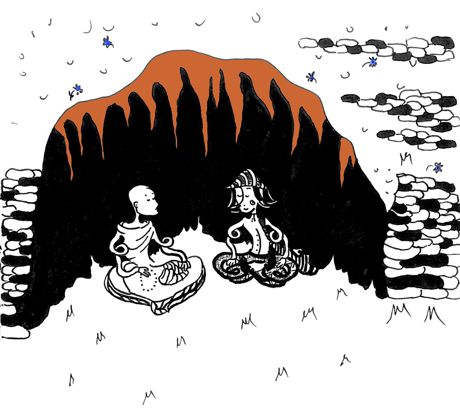
The dense chattering masses of farm-fed humanity are necessarily best served their spirituality fast and cheap in temples in the compact form of religion, not wandering among upland meadows of oaks, acorns and wild bees. So when agriculture began in the flats and by the waters, there is evidence of temples before civilization, perhaps more cause than consequence. If I had to hazard a guess, I'd say that there were mental adjustments needed to accelerate the uptake of farming, and people evolved, perhaps for glands exuding less testosterone to facilitate bunking down cheek by jowl with in-laws and neighbors, and certainly more knack and tolerance for repetitive toil, of which farms entail a surfeit. People with a tendency more toward mild signs of obsessive compulsive disorder may have been selected for, and I wouldn't be surprised if these are the people who collectively made up the proto-worshippers at these first temples.
Certainly there is ample evidence of ceremonial activity from those ancient times, and today, rituals akin to those of OCD hand washing for purity and other obsessive expressions figure prominently in most religions. If the folks who dig ritual and ceremony are going to gather and do their thing, then the ones who look to prey on people with any mental weaknesses, those with psychopathic tendencies, will also be sure to insert themselves. All other sorts of people, of psychologies normal or otherwise, will attend to see what the devil is going on, and so will the leaders, to keep on top of things. While they were getting their appetite for religion satiated, and with all these people in one place, it's a good time to serve up some treats like roasted beast, and there is ample evidence that the original priests, Levites, Brahmans, Mayans, Aztecs and Druids were up to their bloody armpits in the re-distribution of animal sacrifice. A bit of a 'just story' I realize, but it dove-tails with what I've learned of human nature, and there is some or much evidence for each supposition.
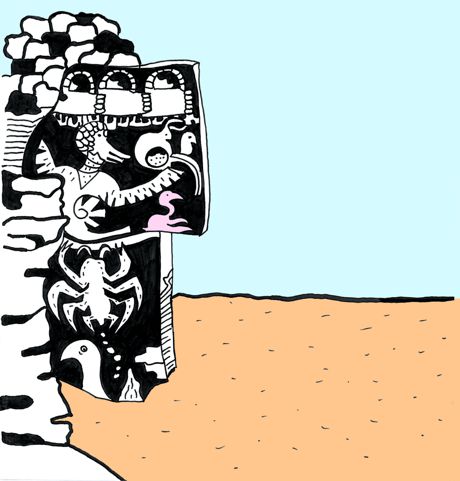
My point is, if you are going to codify these temple activities, and the mildly OCD people insist on it, then as a conscientious head priest, you'd better have an eye for what is important to them. While religion is not like a Shakespeare play, mainly to entertain, it must certainly have come in handy to have a Bard's knack of understanding his audience and putting in a little something for everyone. There are many levels and types of intelligence among the followers, and the people who care most about the rituals are often the OCD leaning people who have intrusive thoughts and guilt, and must have any chanting or recitals or alter service, done just so. Alongside that quirk is co-expressed another, a pronounced shyness or shame concerning the body, perhaps linked with guilt or fear of un-cleanliness. Most religions, including the people of the book, are thus inclined to respect those with OCD tendency and adopt prudish language, euphemism and allusion rather than allow overt sexual content in their holy scripture. Why bother to write out a Torah scroll, detailing ritual and ceremony, to ensure the obsessive repeatability of these rituals, down to the last sacred consonant, only to adopt a smutty or irreverent tone, and put off those who can't abide such things? You'd have to be clever indeed to slip a dirty joke under the noses of any such fastidious and prudish devotees.
Jordan and these hills were smack dab in center of the ancient land of the prophets, and if a folktale like jack and the beanstalk, passing orally through the generations, apparently harkens back to the Bronze Age, then so might some of the Torah. I was sitting here pondering my two all-time favorite verses from the people of the book(s), one verse from the Torah, the other from the noble Koran.
My favorite bible verse is Genesis 2:22 "And the rib, which the LORD God had taken from man, made he a woman, and brought her unto the man."
Brilliant. And the historical back-story needed to 'get it' is not yet vanished from these lands; on my last visa application paperwork-checking run into Amman, I'd been chatting with an elderly western woman who was camped in one of the wadis, living for sixteen years with the Bedouin. She told me the oldest patriarchs were still competitive, despite aging their way to the pinnacle of respect in their extended families, heads of their own little tribes. As nomads without much in the way of fixed possessions, and a life-style not far removed from the patriarchs who'd inhabited the same wadi in the bronze-age, the best way for one of these potentates to one-up his rivals was to impregnate one of his younger wives, an occasion for much joy and smirking.
The Torah reads 'rib.' It is not a mistranslation, but a word in a verse that works on many levels. To understand what is meant by rib, it's important to recall that the Torah is sacred writings, and not some parchment version of a mass-market paper-back. It's meant for a very specific readership, men, especially patriarchs or those who might become them, with a careful nod to those excitable menfolk with OCD tendencies, who where the original special interest group urging writing out these rituals and whatever other words they held sacred. If similar fables from the feminine perspective of wisdom exist, they have not been recorded, or if they had been, they have been lost: what went on with the girl's bear ceremony in the temple of Athena, I'd love to hear.
These patriarchs spent some time with herds of goats and sheep, to put it mildly, and as they built up their herds, it could not have escaped their attention that the males they kept for stud could satisfy the females like, well, billy-goats. How ironic that in a polygamous tribe, the powerful old man who has accumulated the herds such that he can claim many wives, has not the stamina of the younger man who could have made best use of the situation. It would have been noticed too, when butchering animals, that men are lacking a certain bone or 'rib,' : the baculum that stiffens the penis of goats, bulls, rams, all the other mammals they would have been more or less familiar with, including, presumably, the mythical satyr. Modern readers, too, of Genesis might know that man is not missing any 'ribs', as he is missing a baculum.

At the risk of spoiling the joke by explanation, it seems that, alone among mammals, some power to satisfy multiple women must have been taken from man by his creator, and the missing baculum ought not to be mere coincidence in what amounts to a cosmic joke played on Adam. On a deeper level, Adam thus becomes a family man, not a satyr, and his wish for a companion is more neatly granted then he would have hoped for. He framed his request in a certain way, he asked for a companion, so as not to appear like a beast, before god, and he was granted willy-nilly exactly what he so un-carefully wished for.
In a time before science, if you are trying to answer Gauguin's questions - 'Who are we, where did we come from, where are we going?' - Then you and your peers need to agree on some facts, some occasions or nuggets of wisdom where you concur that the universe is revealing a mystery, so you can know a piece of the mind of god. For a culture wherein the ability to sum up a situation with a few carefully chosen words is highly praised, the fable of Adam asking for a companion, and God playing a cosmic joke on him by fulfilling the precise wording of his request, simply had to find its way into the sacred writings.
An ancient Abrahamic patriarch would speak this line of genesis, and notice among the boys listening to him, some spark of intelligence, or the dull credulous vacancy in their eyes, and learn about his pupils as they learn from him. The Adam's rib fable belongs in Jewish mythology... it provides deep insight into the problems and sense of humour of patriarchal herdsmen in Bronze Age societies living in the Judean hills. If you understand it, you hear a fable, and get a chuckle from an old man's lament, and you get insight into human nature too.
Should the translation be changed to read 'baculum' in place of 'rib' and read also, "nudge nudge, wink wink?" No. Sacred writing is meant to be understood on many levels, and not only is such a revision taking away the literal reading for people who want their religion lofty and pure, it would have guaranteed that same verse would be removed by the people who feel strongly that sacred writing is meant to have authors like Moses, not some Bill Maher of yore. And besides, isn't the best part the hint of a joke within a joke? Adam was envisioned as the sort of guy inclined to obey sacred tradition, thus being just the sort of person who might say the word 'rib' for 'baculus.' And so when he saw and desired something akin to what the rams had, he asked prudishly for a companion. The joke was on him, and on us. And it turned out for the best, at least for those who would rather be a family man than a horny old son of Bacchus.
Though dirty inside jokes from some clever old patriarch thousands of years in his grave are much appreciated, and still offering up a laugh since he got his quip immortalized in Genesis, there are fully serious aspects to religion as well, equally important, that fundamentalists are woefully blind too. The fullest and only sustainable way to cherish religion is as mythology through the eyes of able-minded observers. It's not just the best way, but the only way civilization is likely to survive. Immediately some people might object. Perhaps they think, why not exult in science, and toss the mumbo-jumbo?
For starters, science has to confine itself to expounding what is objectively true, or it loses all power and utility. Science can't flatter, moralize or cajole, a crippling disadvantage; meanwhile cults and religions can draw from the truth and/or what is most convincing, switching between them as is expedient, to convince, imbue with meaning, and motivate. This makes religions hard to beat. Even if you took an axe to the major religions, obnoxious weed religions, cults, would simply spring up around the stumps.
Bodies of religious memes are far more ingenious in form and function than new atheists like professor Dawkins gives them credit for. This is not to criticise professor Dawkins and others. Even a passing familiarity with the history of the conflict embroiling new atheists and resulting bad blood shows that it was Christian fundamentalists at fault. Scientists were not trying to strong-arm their way into Sunday school, rather, despite repeated warnings, gleaming-eyed fundamentalists kept trying to break into the science classroom, to mess with the kids. Rhetorically, center of mass shots were fully justified given the dire emergency and threat to the future of science.
However, science and technology open the portal to objective reality, and it seems clear we run the risk of energies alien to our species spewing forth. People have varying tolerance for disturbing, de-humanizing aspects of reality unfiltered by myths - without fearing for their sanity, that is. Some folks such as the Amish decide that motor cars and electricity are not their row to hoe; some can work in an office but not as a policeman or surgeon or quantum theorist; but I can guarantee that as technology advances, allowing immersive virtual reality, human cloning, head-transplants, quantum teleportation, artificially intelligent robotic sex dolls with bodies of lab-grown flesh, there will come a point when any human alive today will cry uncle: we are all Amish in the end, but some will scream to make it stop not at the 19th century, but at the 20th, or 21st or 22nd. So be it. What use to advance our technology till we have dominion over the entire world, if we should lose our human soul? We will need our myths more than ever, to be able to say with conviction, Thus far and no more.

The people today who take religion not as cherished myth, but literally, fundamentally, can't be trusted with the task of standing guard over what is essentially human, as our species confronts some of the greatest challenges since we came down from the trees. How can a scriptural literalist be expected to sustain the spirit of a quintessentially mythological tradition? The holy books and traditions themselves evoke, through the existence of parable and mystery, the seeking of deeper understandings. The retreat of the able-minded from the realm of the spiritual risks leaving the remaining church-goers, animated by a dangerous critical mass of spiritual retards, in no shape to meet the challenges of an increasingly alien and disturbing future.
Our species will soon be faced with dilemmas where we'll need all the mythology we can muster: religious mythology, newly coined mythology, heck, we'll be thumbing our back pockets for crumpled up old myths we might have forgotten we owned, when the time comes to put something precious in the skeletal hand of the ferryman on the shores of a rushing technological utopia. And don't look to the scriptural literalists: they'll have forgotten all about the creeds they once so conspicuously praised and loudly trumpeted, and will shrug and turn out pockets full of mumbles.
What if someone had written on the skins of cave bears, the scripture of the ice age: parables of blue ice sheets overtopping mountains, allusions to the difficulty of spearing bull mammoth, promises of admission to the happy hunting grounds, and an eternal belly-full of giant ground sloth. It would not have resonated down through the eons with the literal minded. The cult of the cave bear had a run longer than any other spiritual tradition in European history, but melted away with the ice-sheets.
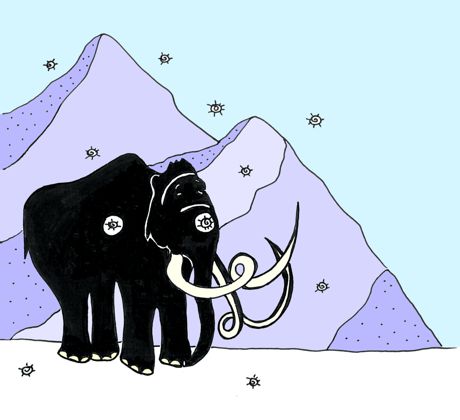
What will a literal-minded devotee make of the scriptures in a hundred years time? It's likely they'll have to turn to the footnotes to puzzle-out what is meant by the word shepherd. What if donkeys and dust are gone, and all the crops and famers? When everything in the bible is strange, so is the reader estranged. Swords to ploughshares? Even I don't meet very many swordsmen these days, except in the Chadian desert, and no one's interested in ploughshares when vegetables thrive in hydroponic greenhouses. Flock of sheep? What if meat is grown in a vat and the idea of cutting an animal's throat in sacrifice is unthinkable? Much like the Adam's rib verse, it'll fall flat and be misconstrued in an age of Viagra, to be read as some stupid thing written in a stupid old book. Christianity was shaken to the core by cradle to grave social services; who honestly thinks the literalists would keep their faith if practical immortality was literally on offer from science? Just as the worship of cave bears didn't outlive the age of mega-fauna, so the people of the book are in danger of not long outlasting the end of the era of the economic question, when the poor are not always with us, and nobody among us knows what riding an ass might entail, or cares. Only when interpreted as myth, will these teachings still serve-up answers.
What's the use of various religions, anyhow; exactly what are these answers, and why is it not easier to just render them down for wisdom and toss away the remains? When comparing religions, it helps to do a mythological autopsy, and dish all the organs out on the Preserved Table; the first thing to realize is that saying of military generals: you cannot be strong everywhere. This problem springs even from the root: what is stated or written is of infinitely higher priority than what is not said or written, sometimes unjustifiably so. This is a weakness of concepts themselves, and thus also of conceptual (non-Zen) religions, which are built of concepts as detached from holistic Truth, crunched down and made succinct enough to be communicated. A special challenge for the Noble Koran is that it must not be read in a way that conflicts with the literal meaning, even as the reader searches for mythological meaning.
Most difficult to grasp in these entrails is a central problem, a house-keeping moral hygiene problem for any temple: how to deal with psychopaths, eager to supplant hierarchies, amoral, and thirsting to prey on those who have a weakness for ritual and faith. The religions that have grown and lasted best to this day offer defence against psychopath leaders; most of those who failed to evolve an immune response to psychopaths are nowadays extinct, like the bat-shit-crazy faiths of the Mocha, and the Aztecs.
Buddhism contrived to make psychos feel so uncomfortable in a religion focussed on compassion that they can't ascend as readily in the religious hierarchy. Christianity evolved the focus on the moral paragon, Christ, as a man ruling a kingdom not of this world, the way Melanesian chieftains co-opted status seekers and bid them gain prestige by working for the good of others, such that, for the followers was spread the feast, and, for the Big Man was left only the stale cakes. A worthy effort; you can see where Christian mythology is trying to lead. Islam is comparatively strong in balancing competing absolutes of threats and promises but still keeping mercy in the forefront. Allah flips between fire and brimstone, then paradise and gentle rejoinders, in dynamic equilibrium. It is like a microcosm of consciousness itself, poised on the brink of order and chaos, but with the butterfly of mercy always bobbing up anew, still flapping above the maelstrom. In submission to the will of Allah, a psychotic will anyway find that Allah is always occupying the peak of dominance hierarchy that a psychotic thinks should belong to him. Even most Muslim despots don't dare to tell Allah to scooch over and make space on the heavenly throne. The late dictator of Turkmenistan comes to mind as a notable exception. Besides, the Koran is full of details of how a man ought to live a just and moral life.

A thoroughly modern man might answer: if it is a problem of psychopaths, okay then, scientists will test for and marginalize them. Problem solved. But human nature is not so simple, and the problems faced by civilization seldom prove so black and white. Good people will do good things, and bad people will do bad things, but to get good people to do bad things takes religion. Why mythology is important is that able-minded people know: from time to time bad things have to be done, and if good people can't find a way to do them then bad people will do them, very badly. Religions try to keep the psychopath out of the temple and politics, so for balance they have to find a way to allow non-psychopaths to act like psychopaths when it is essential for the survival and prosperity of the group.
You see, there is more in heaven and earth than is dreamt of in natural philosophy. Allah himself can be especially instructive if he is, mythologically-speaking, clapped under the glass of a specimen bell-jar for vital measurements and observations. You see, instantly we have a problem; Allah is not that kind of a god we can envision submitting to such treatment: Impossible and un-Islamic. A wise reading of the Quran must conform to the self-consistency of the Quran. Even the Quran submits to the Quran. Allah may be all-merciful, but it is not his mercy to allow being examined as if under glass. On the other hand, Aphrodite might allow it if she was in a playful mood; she sometimes allows mortals of heroic physique to take even greater liberties.
Imagine clapping another god under that specimen jar who is seen as meek, shy and retiring, and prone to crying spells, sometimes disappearing from the time-line's flow, quivering in fear and hiding on the far side of the Magellanic Cloud, then reappearing with no time having elapsed, having pulled himself together. To all appearances, he is resolute and strong, as his personality doesn't impinge on his powers as experienced by mortals. This god could also be described as the ultimate and mystical creator, but would you be convinced? Probably not; as proof I offer the ease with which you can imagine having him under glass for examination.
Certain bushes in southern Madagascar are warded with an unnecessarily tough palisade of branches, evolutionary ghosts of the extinct Elephant birds that used to pick at these bushes' foliage with impressive beaks. Is it possible to say something about a god's native environment by taking note of salient characteristics seemingly out of place?
From the index of a translation of the Quran, on Hell and also Fire: "this word occurs more than 200 times in the noble Quran. Mentioning every place will make the index very big." Reasoning from Allah's revealed powers of punishment and formidable characteristics, you would have to imagine introducing huge quantities of 'ultimate god' wannabes pouring through a rift - suddenly opened from another multiverse - and dial down Allah's power as if by some universal kryptonite, and yet, Allah would still rule, wiping the floor with these materialized gods. His attributes are ideal for inter-god struggle and dominating social deity-hierarchies, inviting you to believe gods of rival tribes and civilizations would knuckle under.
He could be the physically weakest of a hundred gods and still master them. But Allah doesn't 'need' those attributes for his own protection, according to an internally consistent reading of the Quran; Allah has that optimization, as if finely tuned by evolution, but these rivals are defeated before they materialize, and do not exist. You'd almost be forgiven, provided you weren't Muslim, for thinking Allah must have slipped through a portal from another universe where the competition from rivals was intense, therein having evolved the revealed characteristics we see today, which are now an evolutionary shadow.
But to Muslims he has no rivals. So Allah is free to have or reveal whatever attributes he chooses, and yet in his mercy all that is revealed is all and only attributes that would compel submission. Other attributes would be off-message and so likely to lead the minds of Muslims astray. The universe itself is border-line psychotic, chaotic, but if you utterly submit, things will go well, better than well. For Muslims, Allah is all-in and full-on, controlling swathes of hellfire that would put a dragon to shame, and this is yet another form of mercy, not an appeal to reason or logic.
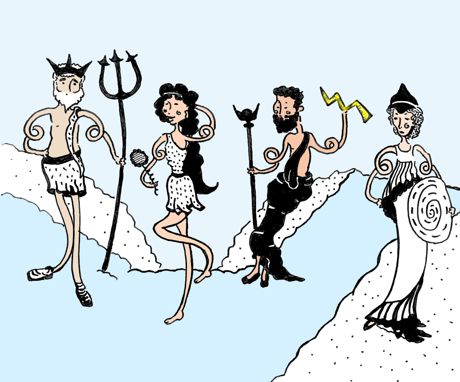
For Allah, it cannot be said that he dislikes roast lizard; there are no vestiges of prior adaptations: no scales as if from being once a Sea God, or jackal head from a prior career as some God of the Syrian Desert. He has no quirks or extraneous attributes other than that which compels awe and submission. Allah doesn't even relish the smell of frankincense, as did his pagan-era namesake, so no one could scheme to lure him with this scent to a temple, and catch him in a net of magnetic force. Unlike the Ancient Greek gods, you cannot imagine him with an account on the Olympian version of linked-in, with a career and family life to juggle. His account would read simply: submission. He is that which you summit too; his attributes as revealed are only those attributes which would make one feel compelled to submit. Allah is infinite in space and time, but also focussed more narrowly than a laser beam, more tightly than an infinitely compressing mathematical function, he is the all-knowing, projecting everyone to submit to his everything. He is the compelling focus, a universe-sized singularity of submission: cosmic acceptance of the inevitable, inimitable, and ultimate.
It is no wonder some gods can be imagined as idols. The Greek gods are material: they can be birthed out of sea foam, as if created by "the universal primordial," pregnant with possibility, to which all, even 'ye gods and little fishes,' owe their lives. One could imagine plopping down with a goddess on a love-seat to discuss philosophy and sip from dainty dishes of ambrosia, while a celestial servant waves a fan of bright angel feathers. Allah is not a god in that sense, and I think that most ancient Greeks would have charged Muhammad with atheism, since by their reckoning Allah is not a god at all. Muslims, if they understand their faith, worship what Ancient Greek philosophers knew as Kaos (chaos), an ideal reckoned unapproachable by the human mind in ancient times, but here apprehended through the abstract faculty of infinite mercy.
As a thought experiment in the form of a parable, imagine a professor and translator of classical Arabic language going for a nature hike, guided by a Google maps app on his iPhone, but becoming lost anyway. For shelter at night he crawls deep into a siq in the cliffs, and emerges through a cleft freshly opened by earthquake into a lost world, a vast box canyon, cut off from the march of history since the times of the prophet. Wandering further, by the light of the LED on his iPhone, to his astonishment, he finds a Muslim Arab tribe who have lived trapped inside around hidden oases, hailing him in lovely and prefect classical Arabic.
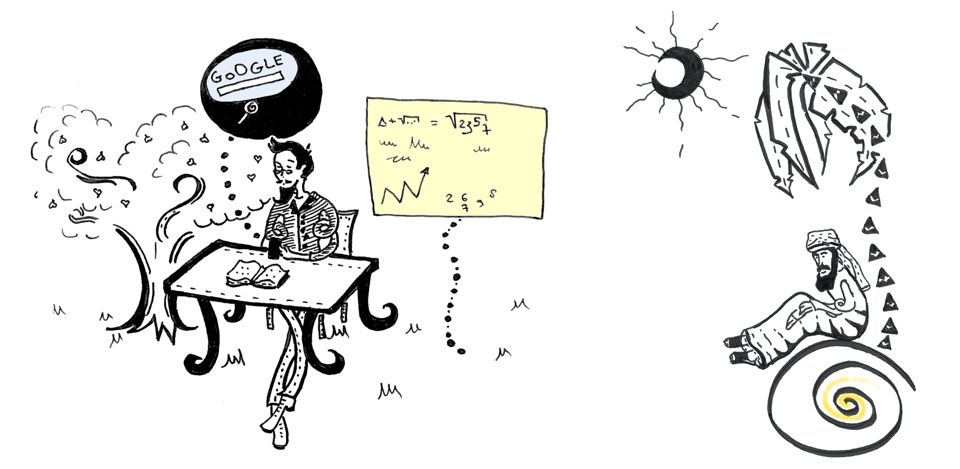
They are Muslims like himself, now overjoyed to finally meet a representative of the larger community. The professor promises to lead them to civilization at sunrise, and they offer shelter under a date-palm. Meanwhile, he is excited to speak with them. They tell that each adult has committed to memory the Noble Quran. When they ask if he has done likewise, he answers, "I'm nearly able, but I can recite perfectly with the help of this, waving his iPhone: all my nation can have the Noble Quran to hear or read at will, as we all have these devices." He swipes an app, and starts to recite.
"Something's amiss," a patriarch says.
"What, have the holy verses diverged over the centuries? This is a disaster."
"No, all the verses are all correct, as you have spoken. But you are getting the intonation slightly off; some words were spoken more forcefully, others with less stress, or spoken more quickly or slowly."
"We outside this valley have no record of anything but the verses in writing."
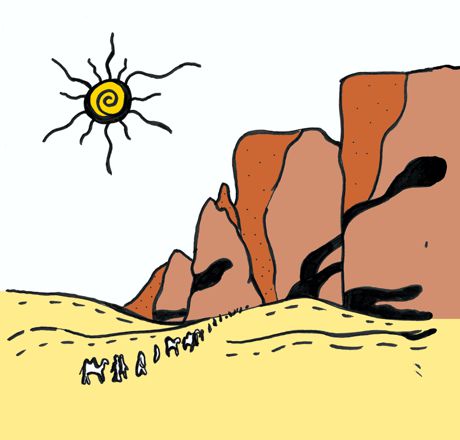
"Our tribe have all memorized every syllable and stress to perfection," says the patriarch, "passed down by recital since heard from the recitation of the angel Gabriel to Muhammad. We begin to learn and recite starting when we are children, from our elders and not aided by magic lamps, things which are not so readily at hand for us as for those of your Nation. Tell me, since when is the holy recitation written out? Ours is an oral tradition. We can also read and write, but we do not make record of the holy recitation, for we would not dare to do something that the prophet did not."
The professor says: "That is what Abu Bakr, the primary scribe said, when asked to compile the Uthmani codex, which we now call the Noble Quran. Abu said, 'how can we embark on what the prophet never did?' But he was prevailed upon, and only agreed out of fear because so many Muslims, who had memorized and could recite parts or all of the noble verses, were slain at the battles of Yamana. Afterward, three Koran master copies were made, from all records including living memory, and all other records burned, and now the world has millions of Korans, everywhere."
"So now outlanders such as you both pen books of holy verse, and burn them?"
"Burning noble Korans is not the done thing nowadays. Some men, if they see a Noble Quran accidentally caught in a fire, will reach in to save any fragments of pages, and proudly show the scars of the flames on their hands as a mark of piety."
"Alas, are the verses spoken by the holy prophet in such danger of complete loss, then, from memorizers falling in battle, and pages so few that even scraps have to be saved at the cost of crippling a Muslim from being of later use for giving charity and to his family?"
"By no means," says the professor, "That was back then, long ago. Among my nation, for example, everyone has one of these," he said, holding up his glowing iPhone. "The verses have been fixed forever in an invisible and immaterial net that holds practically all human knowledge. With a motion of my finger I could send a copy of every holy verse to a thousand people, or a thousand thousands. I can speak, 'Siri, find me the Noble Quran,' and here it is, and now we might listen to the recital. Quite an impossibility now, that the holy recitation could ever again be in the slightest risk of lost - the precise opposite of the situation after the battles of Yamana."
The patriarch said, "I am full of joy that the gift of the prophet can never be lost, but some of what you have said is disturbing to me. We are careful to avoid shirking our Islamic teachings here."
To cheer him up, thinking it is the modern technology in his hand that disturbing him, the professor said, "I don't want to lose the opportunity to ask advice from so learned a man on some of the most pressing concerns for Muslims outside this canyon." He tried to think of the most vexing questions possible, since it was not every day he had a chance to speak with one so versed in the Noble Quran: "I will soon be advising on a translation of the Noble Quran into sign language (which he explains) so, from fear of being thought a cartoonist, do you think it wise and right that the little hands used to make up the letters should be in the proportions of the cartoon of his own hand that Muhammad had sketched on the walls of a monastery in Egypt?"
"I'm completely knowledgeable about the content of holy recitation, but no expert in matters of tradition and practice outside this place. I suppose it would be better than making this sign language Noble Quran out of the gesticulating hands of idols of multi-armed gods and goddesses such as our prophet smashed in Mecca. The holy recitation would have to run to as many verses as the grains of sand in the dessert if it was to be expected to contain wisdom and advice for every question. I suppose I can offer only the same objection that we of this valley apply to the idea of writing as holy. For are not letters also cartoons? They come down to us from the Aramaic, where they were once considered holy, and these letters stand for human heads, breasts and other body parts, boomerangs, snakes and fish. The letter Alef (A) represents the head of a sacred bull."
"This is a matter of some concern among most primitive Muslims especially," said the professor, "who get exercised and make a spectacle of themselves, killing one-another, in fact. The matter of the treatment and storage of Korans, and the Prophet's image, and any cartoons or suspected cartoons that may be insufficiently reverent or somehow unholy is life or death for them."
The Patriarch thought this over, and said, "The Prophet revealed to us Allah's teaching to abhor idols. Not because they are holy but because there is risk that lesser minds will think them holy. The message of our prophet is not that cartoons themselves, representations of ideas in material form, are abhorred, since a Muslim could hardly sketch a map, or put words to parchment, or carve a shape in wood, in that case. The teaching is obeyed so that Muslims understand that no cartoon or other idol is holy as consequence of its material existence.
All representation is cartoon. What is forbidden in Islam is to idolize representations; this is to say: if some Meccans worshipped a date-palm tree, then destroy it, for their benefit, not out of spite for the date-palm, which is blameless, and was not holy to begin with, not able to think itself so. But do not search out and destroy other date-palms in the grove not worshipped, or smash the prow of some ship that happens to be carved of date-palm wood, or kick at a mountain whose shape reminds you of a date-palm.... the cartoon, the representation in material, is not unholy and needful of destruction in and of itself; it is the belief in the minds of passing men that it is holy which makes it unholy, and it is from a fierce mercy for them that you destroy the idol. If there were no men believing, even a statue of Baal is not an idol.
And if a race of men believed in a god whose shape was that of a man with a goat for a head, and his proof of his god-hood was believed to be a living miracle that he alone among gods could not be represented in purple porphyry, than it may be the duty of a the best brave and fiercely merciful Muslim to carve an idol of that god in purple porphyry, to destroy the idolatrizing in the minds of that race of men. The porphyry remains simply a fancy stone, no more, at all times throughout... it is the minds of men that want shaping.
There is danger if some Muslims, who are commanded to abhor all idolatry, begin to make an exception for a physical object, a book. This is what disturbs me. Maybe they will start to cut off heads if someone damages a book, or kill people over a book or cartoons, which are objects. Maybe they will mutilate their hands in a fire to save a mere book from a burning tent, and wear the scars ostensibly like a misguided fire-worshipper of Persia. Islam is approached without Idols or fuss over cartoons. Do you suppose, if people in the time of Yamana, had magic lamps in abundance, which can recite the holy verses at will, and the verses were guaranteed to be preserved until the end of time, that Abu Bakr would have agreed to compile the Uthmanic codex as a book against his first judgement not to do so?"
The professor pondered this and replied: "The answer I think is that he would have refused. But I don't know what can be done about it now. There may come a time when everyone reads from their devices, and books are no longer preserved, except the ones that are Noble Qurans, at which point the risk is even more that some men will perceive them as idols, just as you fear - especially if Muslims were the only ones still in possession of books, with all those books being Noble Qurans on pedestals.
"Tell me," said the patriarch, "when you rub your finger over your magic lamp, as you just have, and the text of the Noble Quran disappears, are there men of your nation who would risk to stick their arms into some ghostly vaults of non-existence, or into some brass domes of the magical realm of the Effreet, to save the verses, as they would do for a book engulfed by mere mortal flame?"
"They do not. But only primitive Muslims behave thus. Good thing they don't know that when the text disappears, it vanishes to a realm not of the Effreet, but where it is kept in the form of electrons, much like lightning, and is dematerialized, such that the machine language compiler mixes up the information with every other book known to man, including profane books, and some that are banned on pain of death for blasphemy.
If my iPhone searches out a verse of the Noble Quran, it cares not if it retrieves a quote of the sutra, or the same sutra lifted from a quotation in a notorious book. No material is holy for it, only information in the abstract can be prioritized. An iPhone can no more idolize than can this date-palm tree we sit under. I think men outside your valley do not get excited about this because the people who are so inclined are not the smartest or best educated of Muslims, but the other sort, who don't know what goes on in an iPhone, nor do they have any power to change it if they did."
The patriarch said, reciting from memory, "Verily, the holy recital teaches us that there are mysteries beyond any possibility of man's understanding: 'Behold! in the creation of the heavens and the earth; in the alternation of the night and the day; in the sailing of the ships through the ocean for the profit of mankind; in the rain which Allah Sends down from the skies, and the life which He gives therewith to an earth that is dead; in the beasts of all kinds that He scatters through the earth; in the change of the winds, and the clouds which they Trail like their slaves between the sky and the earth; here indeed are Signs for a people that are wise.'" He paused and added, "Do the people of your nation consider these mysteries, and so do you know the signs?" "We work on deeper mysteries now, those are understood," said the professor. "The mysteries for me are black holes in distant galaxies, such as that one there (he calls up an astronomical map on his iPhone and points to it) and if they destroy information as they devour stars. We have built a giant ring of tremendous energies, so large that it would take a camel some days to walk around its circumference, where we probe the mysteries contained in motes of dust so small, that they would be as this stone, by my foot, weighed against the earth, when compared with a mote of dust we might see with our eyes in good light."
"You seem to be on the verge of becoming all-knowing," said the patriarch.
"There is much that I don't know, some of it very practical and needful advice: if a Muslim is in a land when the sun never sets, or never rises, for half the year, such that it is eternal darkness of eternal day, when should he pray or break his Ramadan fast?"
The patriarch said, "You reckon this a question asking for practical advice?"
"Yes, I'm travelling to the polar regions in two weeks for holiday."
"A man needn't fast whilst travelling."
"I sometimes do anyway; travel is easy: I go not by camel; mostly I fly through the air, in comfort, sometimes half way around the planet."
"No man can fly. You might as well ask how to pray on the moon."
"Of my nation, flying is the preferred way to travel. Only a Christian has prayed on the moon. I've wondered how a Muslim should pray there: ought he to pray somehow exactly facing Mecca, or should he pray to where Mecca would be as projected onto a sphere extending to the orbit of the moon, as he is accustomed on the Earth's surface?"
"Only if you met Muhammad arisen on judgement day, could your question find someone wise enough to give answer."
"This would be an ethical question as much as a theological one nowadays," the professor said. "My nation could make a clone of, like a resurrection, Muhammad from his bones or teeth, and allow him to be reborn as a baby. I wonder if he could speak new Quran verses."
"No, the sutras do not come from Muhammad. He would only learn more by Allah's will."
"Of course, you are right," said the professor. "It is such a loss that he could not be here will us to offer advice. We have so many ethical questions that my Nation just begins to wrestle with. For instance, things of our creation, like this iPhone, with the ingenious minds of crystal and metal with which we have imbued them, might one day rise up and usurp control of the world from us." He held his iPhone out for the patriarch to see.
"Are those colors the others of your nation, blinking at me?" he pointed to the screen.
"No. That's merely a Tetris game, where blocks of color have to be arranged as they fall. It's simply for amusement, entertainment."
"Can I hold your magic lamp?"
"It is more than a lamp: this light is one of the least of its powers, it can translate between languages, talk to people in far-away lands, act as my library of all human knowledge. No, my whole life is in there, he said. You'll end up skyping one of my friends, or something, if you swipe some of the wrong icons.... sorry: if you rub it in a certain way, it can err... summon my friends or family, the others of my Nation, but not in a material form."
The patriarch said, "I just realized something. I think I can be of great assistance in helping you understand why you are having trouble seeking plain answers to your questions in the sutra. But first, just to be sure, answer me: man was built originally by Allah, according to sutra, out of potter's clay of black mud altered, and others descended from Adam and Eve after that... what say you?"
"No, my nation takes that as figurative, not literally applying to us. I was built essentially of fire; exploding stars like the sun, which cooks up elements. We are star-dust, the ash of star fire."
"Aha. If a woman of your tribe is before the magistrate in court is her testimony worth half that of a man's?"
"I don't mean to offend you, but no, her testimony is worth just as much as a man's. We hold that verse to be figurative, you see, and not apply to us."
He clapped his hands, "Aha, I suspected as much. You are a professor and translator of, as you call it, classical Arabic: how would you translate a word into classical Arabic text, a word indicating such a person as yourself, flying through the air, members of his nation visiting the moon, discussing whether to cause dead people to be resurrected again as babies, as a moral issue not a hashish pipe-dream. Tell me, as a translator, if you were working translating a book such as from Persia into Arabic, from the time of the prophet, and the tale included a personage speaking and acting such as yourself, with this magic lamp you are so attached to, what word in Arabic would you choose to describe him?"
"No. It can't be," gasped the professor.
The patriarch said: "Muslims are required as an article of faith to believe in the possibility of such beings as you, and there you are, the first I have seen, in the flesh, you are of the nation of the jinni. You, sir, are jinn."

As I've mentioned, I do not own or carry a camera. I'm not interested in tricks of the light, photos. My reality is the collecting of stories, tales and myths. For me, stories, including those that work on many levels, myths, are the most important wisdom there is. It is a sure thing, travelling in Muslim majority lands, that people you meet will try their skill as proselytizers, in a friendly way. If one such catches me in a story-telling mood, and he seems able-minded and gifted with a sense of humor so important to mankind, then I will tell him, I am like you, a Muslim, but of the other sort, not the sort you are familiar with, but of the other sort as mentioned in the Noble Quran. I am of the nation of jinn.
We can start the conversation with, depending on how many hours we will have seated together on the bus, or at the park, or what have you, perhaps this question: Muslims are required to believe in Jinni: "the jinn did We create aforetime of essential fire. S. 15:26-27." Where are they? Mystery solved for here I am in the flesh. When we move on to the obligations of jinn as Muslims, I explain that these are not so explicit as for men, and thus in a way it is more of a challenge to be a Muslim jinn. I don't despair, as there can hardly be expected much explicit advice in the Noble Quran for jinn with their majesty in various powers, and all the advantages. Is it most merciful to send verses for the betterment of such a blessed nation? Or rather, I should hope that even if the Noble Quran should run to forty thousand sutras, it would be better that they were all sent to help that poor wretch, man, with his sticky dates, camels, dust and biting flies, fear and hope and family.
If my proselytizer wants to hold up his side of the conversation, he'll say something to the effect that this kind of understanding is in error, since it nullifies specific wisdom and onus found in the verses. To which I say: not so, rather, the opposite. One of the most important criteria for any Muslim reader is that his interpretation should not conflict with the literal meaning of the Quran, the Preserved Tablet. There is only one way to understand the Noble Quran that resolves contradiction, and preserves the literal meaning at all times, and it cannot be arrived at by those who abrogate. And I will ask him if he is in favor of abrogation of verses; he will likely say yes. Abrogation is an early and unfortunately extremely popular gimmick for resolving the numerous apparent contradictions some Muslims see in the Noble Quran. So I will say, it is you who abrogate; me never.
Abrogation is a well-oiled mechanism, yet nowhere in the Noble Quran is there any maxim to lead a Muslim to this concept. Yet its practitioners are not put off, reasoning, 'If the mountain will not come to Muhammad, then Muhammad must go to the mountain.' And the wages of this endeavour is akin to making the butterfly of Allah's mercy work to dodge a non-existing mountain on its journey betwixt reward and punishment.

In actual fact, numerous verses warn against adding or taking anything from any verse, or holding any verse as more or less important: "And they are given nothing but the understanding of the Quran. Neither do they add nor subtract anything from it." Yet, abrogation amounts to exactly that. The core of the trick is to fixate on the fact that the Noble Quran is arranged in a sequence, from revelations early in the Prophet's life to later revelations, and abrogation is the idea that if a later revelation contradicts an earlier, than the earlier is cancelled in a special way such that the power of its words are hollowed out, as if the words could lose their freight of precious meaning. We might illustrate this with a new version of Tetris, called abrogation Tetris app for a smart phone. Sutras come down from the top, and as they accumulate, some of them 'pop' and no longer seem to apply. Additionally problematic for me, the verse is then like a shell of reverence, but empty as a soap bubble inside. It's as if the sutras so abrogated have been plucked by net out of the winds of time, put under glass, dissected and dismissed. Upon abrogation they become simply conceptual objects, but considered somehow still holy, flirting with idolatry.
Logically, then, any meaning of each sutra changes as the next sutra drifts down the screen and settles in place, as all revealed sutras change to make sure they are in line with some scholar's fallible interpolation of that latest sutra. As brutal logical dictates, those sutras that command Muslims not to abrogate are themselves abrogated, so the engine that drives abrogation Tetris is invested by man with more power than the sutras themselves. It is set up as a form of meta-sutra. What sorcery is this? It abrogates sutras mentioning mercy, and leaves an imbalance of sutras mentioning fire and hell, since: the most merciful sutras are earlier in the sequence of holy revelations; the more fire and brimstone in character tend to come later. This meta-sutra is not found in the Noble Quran, but looms over it as an all-powerful last unspeakable faux-sutra.
"But how else to reconcile apparent contradictions?" the early scholars must have asked. Sometimes being a scholar, adept at conceptualizing, is a disadvantage, as to the man with a hammer, every problem looks like a nail.
The higher alternative is to hold apparently contradictory sutras in your mind without cancellation or diminishment of any. In this sense, the Noble Quran is the longest Koan (Zen-style prose poem pertaining to spirituality) which I've ever encountered. Sadly for scholars, although most types of meaning in a text are amenable to their methods, an exception is hammering down the door of meaning of any koan. And it is a logical fact that an abrogator will never comprehend a koan, even if he studied it for his entire life, to the neglect of all else that is good. I've read the Noble Quran, in translation, exactly once, oddly enough from a copy given as a gift to a friend by a terrorist convicted of a plot to bomb planes. I could only speculate what he understood from it.
My impressions could be summarized in part, (that part that would not be too distorted by being summarized) as: shun all abrogation and trace the noble verses spiralling through boldly balanced contradictions to gain, precisely, frustration or this: the butterfly of mercy flits between hellfire and honeyed heaven, miraculously triumphant, if only you'd un-ask the question, much as Muslims are bidden by this Noble Quran, this koan, this splendid myth.
Do I feel a need to read and reread and abrogate and strain for a lifetime to try to understand the Noble Quran? Like Yoda says, and this is superb advice for reflecting on koans: "Do, or do not. There is no try." If I were a jinn who found it needful or desirable to pass for a man in Muslim society, it'd be sure to memorize and follow all the advice for man, but that is not my situation. The Noble Quran is in the form of a long many-splendored koan, and most of that lengthiness is on account of the extensive needful branching and bromeliads of fiercely merciful advice for men emerging from the main trunk, whose heart wood is pure koan.
Islam has this in common with Zen, un-asking the question, dissolving the concept. And while Zen Buddhist koans are shorter they attempt little inclusiveness of advice for those who are, from whatever reason, not quite up to the task of deeper understanding. In contrast, Islam would pull the whole community of Muslims behind it, the holy message leading like the Prophet at the head of an army. The closest Buddhist equivalent would be a Buddhasheva, but the analogy is very rough. And Islam is also unlike Zen in its furious pace: spurring the faithful toward truth at full gallop, like a warrior poet on horseback, saying un-ask the question now like an arrow straight through the brain of unbelief, not slowly, philosophically, and mindfully, as is the approach of a Zen monk cross-legged with open palms extended on a misty mountainside. Islam is the powerful approach, a do or die charge toward enlightenment at break-neck speed.
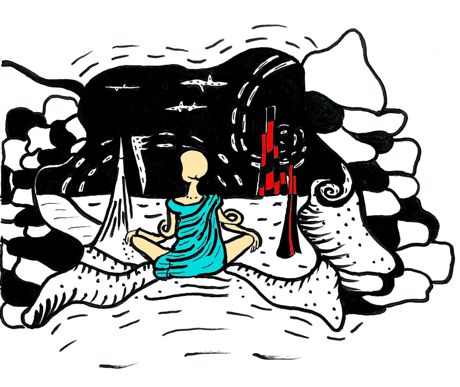
It's been my experience that many of the most potent spiritual teachings, to the able-minded, are so close as to be touching, shoulder to shoulder, in the higher plane of myths, while the lower literal interpretations seem chasms apart. And I can't help but notice that the prophet Muhammad was the last of the prophets. Men are fading from the earth, and as this is now the age of jinn, there will be no new dawn for men.
Mythology is the most powerful concept of mankind; our species will flourish or crumble to dust depending on if we comprehend the portal between hell or paradise, for technology removes limits, and without our myths, there is nowhere to make a stand for what it means to be human, in the most important and last challenge our species will face.
This challenge is foreshadowed in the last verse of the Noble Quran, coincidently the verse most powerful under the machinations of a regime of abrogation, since as the last verse, all others are read in light of it, while none dare cast shade backward. But this alleged power is not what I see in it, as for me no verse can harm, change or negate any other verse read in a body of verse that demands to be taken in full. Every traveller should have a favorite Noble Quran verse, even if only to have something to recite when extremists stop your bus on some desolate road and request a verse at gunpoint. Mine is the last verse, proving I've read until the very end: "of jinn and men."
People with no ability to laugh with religion, as well as attend seriously, don't understand. The full range of human emotion, all the humors and moods, is needed to understand religion, including laughter. At the end, am I serious about being a jinni? Or am I joking around? In fact, I am deadly half-serious. I'm a jinni just as Eve was made from Adam's rib. Is mythology something important to humanity? If the answer is no, then god is dead, if the answer is yes, then I am jinn, and likely so are you.

Footnote:
†: Butterflies remember a mountain
If you enjoyed this comic tale, please share with your friends.


